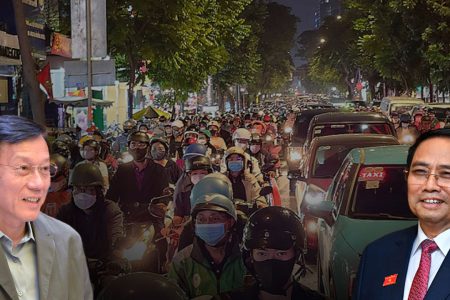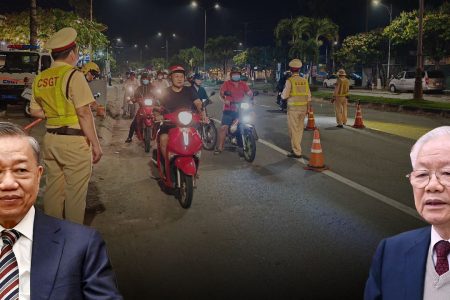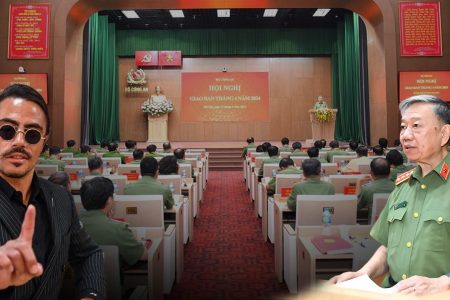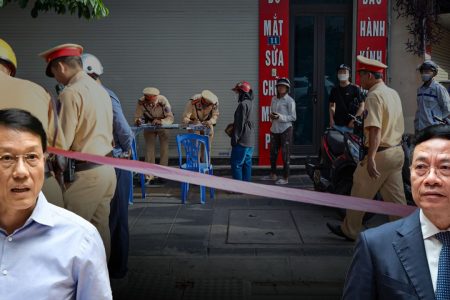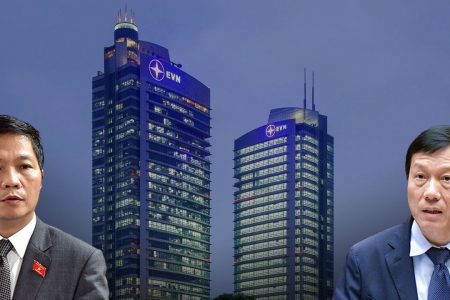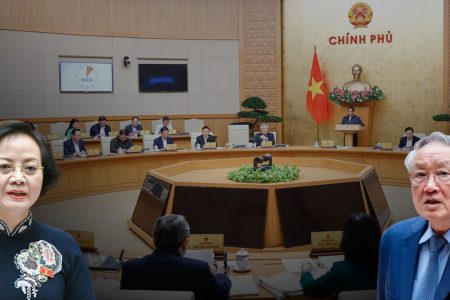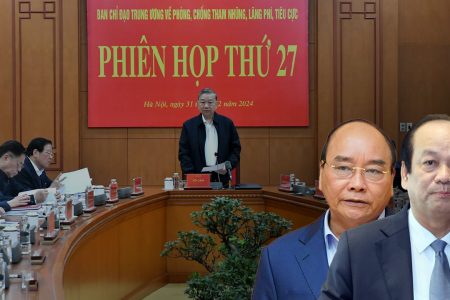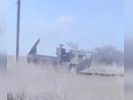
Videos of the ceremony of “taking the offering bowl” on the occasion of Vu Lan’s filial piety festival, held at Ba Vang Pagoda, caused a “storm” on social networks in the past few days. People reacted to the event, and considered it “offensive” but also because this was the first time that the senior leaders of Vietnamese Buddhism openly argued and criticized each other in this case.
Many controversial opinions
Pictures in the clips show Venerable Thich Truc Thai Minh, abbot of Ba Vang Pagoda in Quang Ninh, along with many disciples who continuously collected money from participating Buddhists, creating many controversial views.
A Buddhist whose dharma name is Quang Thien told RFA that she greatly underestimated Ba Vang Pagoda’s activities. She said that even those in the highest hierarchy here do not fully understand the value of the Vu Lan festival or the meaning of begging:
“Vu Lan is Mother’s Day, even if the monks in the temple organize a festival, they must serve filial piety, but here, an alms ceremony is held on the day of the filial piety.
A deeper discussion of alms-giving. ‘Khất’ means begging, and ‘thực’ means eating. It means begging for food.
‘Khất thực’ is a food begging, but monks also took money when followers give it. Khất thực is only allowed to receive food from other people, if you meet poor people, you can give them food. If people give money, they can’t accept it because money can’t be eaten.”
A monk whose Dharma name is P.T., who is currently practicing at a temple affiliated with the Vietnam Buddhist Sangha, said that: “the offering ceremony at Ba Vang Pagoda is a hybrid between a traditional ritual and a modern offering ceremony. Nowadays, many people tend to offer money rather than just offering food, which is also normal.”
According to this monk, perhaps, because many people have preconceived ideas about Mr. Thich Truc Thai Minh in old scandals so they criticized so much:
“Actually, I don’t find it offensive at all. I think some people have a prejudice against Mr. Thai Minh in the past.”
In 2019, Ba Vang Pagoda was exposed by the domestic press for the organization of unjust ceremonies including calling the dead, entering the soul, judging the number of lives, being forced to pay debts for the dead with the money requested by the dead, through the form of collecting money for merit to Ba Vang Pagoda…
As the abbot of Ba Vang Pagoda, Mr. Thich Truc Thai Minh was temporarily suspended from all positions in the Vietnam Buddhist Sangha and had to repent to the great monk.
Two Venerables quarrel on social networks
Responding to the state press on August 17 about the videos of Ba Vang Pagoda, Mr. Thich Nhat Tu, Deputy Head of the Executive Board of the Vietnam Buddhist Sangha in Ho Chi Minh City, affirmed that the donation at Ba Vang Pagoda is “inappropriate” and “similar phenomena should be avoided.”
On August 18, the Facebook page of Mr. Thich Truc Thai Minh posted an article titled “Ven Thich Nhat Tu should look at himself before criticizing the Ba Vang Pagoda.”
The content of the article recounts the times when Mr. Thich Nhat Tu used to beg for food, as well as a statement encouraging Buddhists to make offerings with money instead of traditional food, and at the same time asks the question that “why does the Venerable Thich Nhat Tu be so capricious, betraying himself and the Buddhist tradition of begging for alms and gaining longevity?”
It is rare for two monks of the Vietnam Buddhist Sangha to quarrel and talk openly on social networks.
Commenting on this issue, Venerable P.T said Venerable Thich Nhat Tu has the same role as the “speaker” of the Southern Vietnamese Buddhist Church. Therefore, all events related to religion that are interested in Buddhists, he must speak out:
“It’s a matter of two ‘adults’ talking to each other. Because they are famous people, any of their statements are scrutinized.
Mr. Nhat Tu has difficulties. If I were an outsider, I wouldn’t understand his difficulty. He is like a spokesman for the Buddhist Church in the southern region.
Now Ba Vang Pagoda is creating a scandal, subject to criticism from people. People put a question mark as to whether the incident is right or wrong, then Nhat Tu is in a position of being forced to explain, not saying no.”
In the post on Facebook Thich Truc Thai Minh also said that the almsgiving also “contributes to the government to implement the social security policy that is in accordance with the Buddha’s dharma, in accordance with the law, in accordance with Buddhist activities at home and abroad today.”
This statement made Quang Thien Buddhists ask the question:
“He also said that making offerings to the temple serves social welfare. The question I want to ask is at what time do religious people have a responsibility to make financial contributions to social welfare?
What true cultivators need to contribute, more precious than gold and silver, is cultivating wisdom and respecting the truth, educating Buddhists to extend compassion and respect for life, how to let Buddhists understand that the nearest Buddha is the ‘Buddha at the heart’, respecting his mother, loving his fellow man and how to improve social morality.
Both Mr. Thich Nhat Tu and Ba Vang Pagoda’s monk have the same hatred and hypocrisy!”
On August 19, Venerable Thich Gia Quang, Vice Chairman of the Executive Council of the Vietnam Buddhist Sangha, made an official statement, still asserting that the offering at Ba Vang Pagoda is “not up to standard.”
At the same time, he also said that this pagoda is not under the management of the Vietnam Buddhist Sangha, does not participate in the Executive Board of the local Buddhist Church, but is directly managed by the local government.
“The government controls all religions, there is no exception!”
After the videos were posted on the Facebook page of Ba Vang Pagoda, on August 16, Uong Bi city, Quang Ninh province set up a team to inspect religious activities at this temple.
The inspection team concluded that the “offering bowl” activity was organized in accordance with the law. However, the images and videos posted on social networks are controversial.
Therefore, the People’s Committee of Uong Bi city requested that these videos be removed from the Internet because they included “an objectionable image of a monk receiving money at Vu Lan ceremony.” The People’s Committee of Uong Bi city also assigned functional agencies to strengthen the management of religious and belief activities at worship facilities in the city.
The Ba Vang Pagoda side said that they accepted criticism and agreed to remove the above videos from social networks.
Commenting on the fact that the government has intervened in religious activities as mentioned above, Venerable P.T always affirmed that certainly all religious activities in Vietnam, not only Buddhism but all other religions, are controlled and monitored. But if they don’t attract attention, monks can still do religious activities:
“Certainly, all of our activities are controlled and monitored by the government, unable to escape. The government always monitors the activities of all religions to regulate their activities.
For example, when celebrating Vu Lan, we must always invite the authorities and when they leave, we still have to give them some money.
If I act without drawing attention, no one will touch me.”
The draft amendment to the Law on Religious Beliefs, which is being consulted by the Government for approval in the near future, is said to contain provisions that stifle religious freedom. For example, religious establishments must notify local authorities one year in advance of all planned religious activities. Those who are ordained or nominated as religious dignitaries must be approved by a competent state agency…
Propaganda’s “Powerful Arm”
The Venerable also told RFA that the Vietnam Buddhist Sangha is an “effective arm” of the Propaganda Department. This was repeatedly confirmed by the officials themselves to religious dignitaries:
“Recently, I just attended the Conference of Religious Dignitaries (don’t want to specify the location for safety reasons). It is said that “great national unity, unity of religions” must be carried out, and all religions are an integral part of the political apparatus.
People take me so high! But actually, I know that people put me like that just to control all my activities.”
Religious followers have long been considered sensitive by the government, according to Venerable P.T. Because religious followers are both large and willing to listen to spiritual leaders, but not necessarily follow the government, the state’s policy is on the one hand to always speak highly of the role of religion, but on the other hand. also, strengthen the grip and control of religious establishments.
Thoibao.de (Translated)







